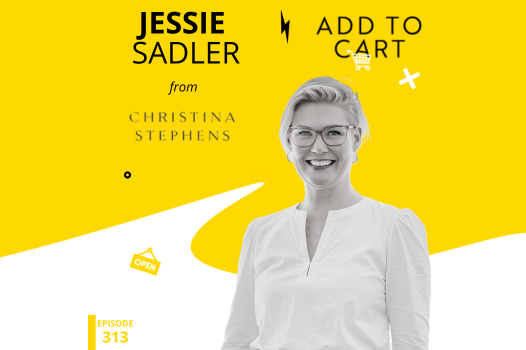In this episode of Add To Cart, we are joined by Jessie Sadler, Founder of Christina Stephens
Adaptive clothing label Christina Stephens, allows people with disability, dexterity issues, and changing bodies to wear clothes that are both functional and fashionable. In fact, Christina Stephens was on the runway at Australian Fashion week last year. In our chat, Jessie shares her top tips for accessible ecommerce, how a powerful admission from a nervous groom led to some sexy lingerie and why representation makes good business sense, both ethically and financially. Oh and she also talks about bullet proof jeans…yep, you heard it here first!

“If you can’t see yourself, in the media and marketing of the business that you’re buying from, your relativity or your appreciation of the product is minimised.”
Jessie Sadler
The power of fashion is huge
“When we get dressed in the morning, come up with a look that we want or an impression that we want to make and that’s how we curate our outfit for the day. People with disability in many circumstances don’t have that opportunity because of the products available in the market. That would be my first point to retailers – treat everyone equally and understand that the retail experience, the fashion experience has the same impact on people across the board.
But even in the disability community, perhaps even more because what you wear often creates the perception of how other people perceive you. And this isn’t my quote, this is my business partner Carol’s quote, but people with disability are often very underestimated because of how they look and what they wear. And you can imagine with more choice and greater participation in the retail experience, how that would help people’s emotional state, psyche, and how people perceive them more generally. And that’s a big, big, big thing.”
Quick wins to greater inclusivity
“Media marketing and representation is a quick win and it has a huge impact on people. If you can’t see yourself in the media and marketing of the business that you’re buying from, your relativity or your appreciation of their product is minimized.
So including models with disability in media marketing, understanding some of the language nuances that could be offensive or just a bit off the mark for the disability community is important and there are certainly consultants or written resources out there that can help with that. I think that that’s the quickest win and would have a huge impact on customers with disability.”
It’s good to talk
“We have a really high customer return rate and I think that’s testament to the quality and the design features of our collections. But also it is a tight knit community and there’s a lack of product in the market. So we’re in touch with our customer base through many channels.
Like most e-commerce brands we seek reviews and we take our abuse seriously. If a review is under four stars, we reach out to that customer by phone to have a conversation with them about what was wrong..not necessarily wrong, but what wasn’t suitable for them? And seek ways for improving or incorporating their feedback in our designs for the next run.
So we do we do telephone customer reach outs once a week or once a fortnight depending on the reviews and we do telephone customer reach outs to our high value and repeat customers.”
Links from the episode
This episode was brought to you by…




